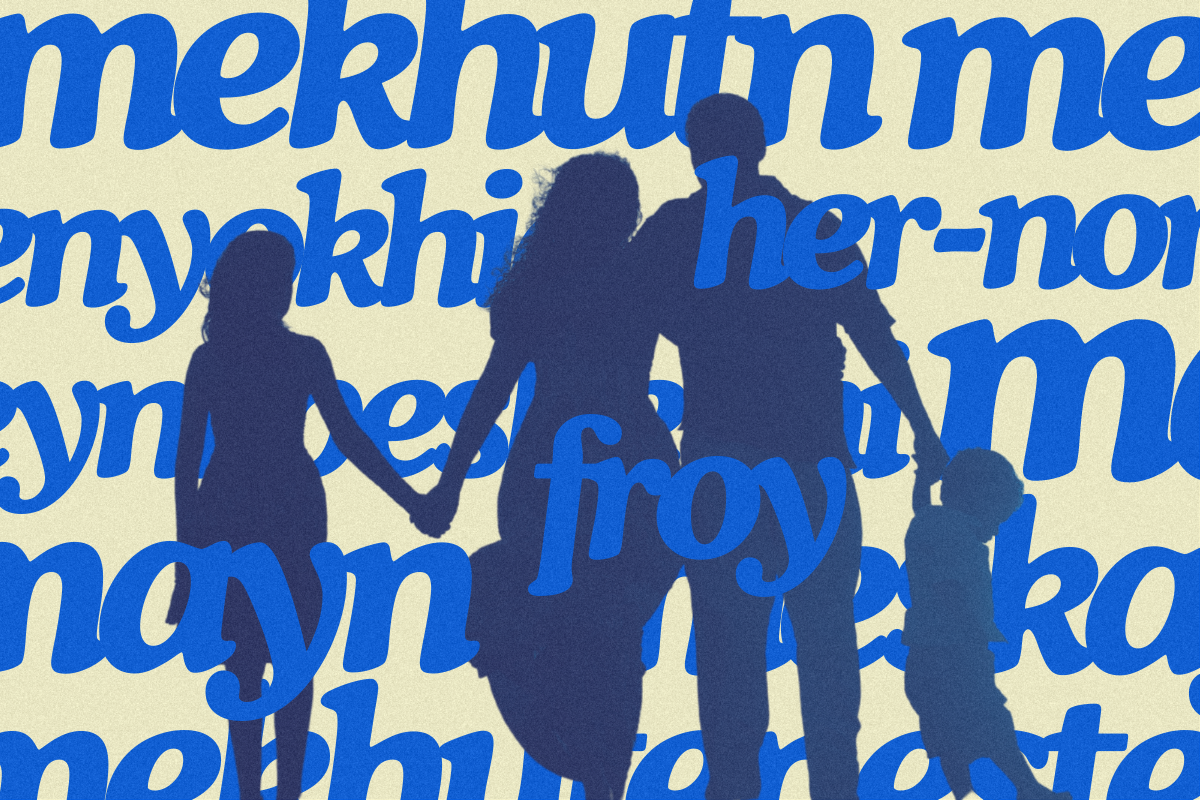“What do you want to be called?” I asked my mother, just after my child was born. As her first grandchild arrived, she would suddenly have a new designation: Grandmother. I assumed she’d want to be “Bubbie,” like her mother was to me. Yiddish is my mother’s mother tongue, a language that linked her to her Polish-born parents and the pre-Holocaust world of Eastern European Jewry. Both my mother’s parents were the sole survivors of their sprawling Ashkenazi families. As my mother often reminds me, she never had a bobe or zeyde. Neither did any of the kids she grew up with. It was a restoration of the natural cycle of things when I was born, and her parents became “Bubbie” and “Zaidy” — the pattern reestablished.
When it was my mother’s turn, I was shocked to find that she felt differently. “I’m not going to be a ‘Bubbie’,” she said, rather quickly. “I’m a ‘Savta’,” opting for the Hebrew word that gestured toward a sense of Jewishness rooted in the homeland, not in the diaspora. I was winded. I knew plenty of people with savtas — but my child wouldn’t have someone to call Bubbie? I never imagined it, and I demanded an explanation. “We look forward. We don’t look back,” she said. And that was that.
The well-known Yiddish folklorist Beatrice (Bina) Silverman Weinreich wondered about Yiddish kinship terms in a 1954 study and found that, like the attachment I felt to “Bubbie,” Yiddish terms for family members are far more than just words.
Take mekhutn and mekhuteneste: your child’s in-laws. In English there are no terms for one set of in-laws’ relationship to another’s; they’re simply the parents of two married people. But in Yiddish the parents of married children have a direct social relationship: they are one another’s mekhutonim. This matters because the social hierarchy is dictated by prestige: if your mekhutn is an illustrious scholar, your own prestige is enhanced. If not, well — khas v’sholem (God forbid). In addition, good mekhutonim were important for the institution of kest, where free board and lodging were given to a young married couple by the bride’s parents. You didn’t want your mezinik (youngest son) or your benyokhid (only son) living with just anyone.
Kinship terms are a window into the worldview of Eastern European Jews and the ways they related not only to one another, but also to those around them. As a distinct minority outnumbered in a largely hostile landscape, these extended kinship networks were for Ashkenazi Jews a matter of survival — social, political and religious.
This is why distant cousins two, three or even six or seven times removed have a designation — sheyni besheyni (second with second), sheyni beshlishi (second with third), etc. — because while traveling through Europe in dangerous and impoverished conditions, it was necessary to know where you could find a warm bed, a hot meal and other kinds of support.
Referring to an only child as a benyokhid/basyekhide at the time of a parents’ illness or death indicated their obligation to recite Kaddish, the Mourner’s Prayer. A widow (almen/almone), divorce/e (goresh/grushe), deserted spouse (ogen/agune) or orphan (yosem/yesoyme) — those whose family was considered incomplete in some way, and therefore whose social and economic life was precarious — relied upon internal charitable Jewish communal institutions.
Beyond a doubt, my favorite category of kin is only a footnote in Weinreich’s study: spouses, partners, significant others. Though man and froy are modern standard Yiddish terms for “husband” and “wife,” not everyone used them, and not all the time. Weinreich says the Ashkenazi preference for avoiding any kind of PDA extended to the realm of language too: In order to distance oneself from public displays of intimacy, you didn’t even refer directly to your own spouse. You called them, simply, mayn or mayner (mine). (Very much like calling a newborn baby a mieskayt, an “ugly little thing,” to avoid the eyn-hore — Evil Eye — Yiddish is all about the art of indirect address.)
If mayn/mayner still felt too direct, you could refer to your S.O. as your tsi-hertsu, literally, your “do you hear?” An additional term for “wife” was her-nor — literally, “just-listen.” You’d say “mayn tsi-hertsu,” or “mayn her-nor” (my do-you-hear,” “my just-listen”). Names in Ashkenazi culture have spiritual power — think of the custom of naming a sickly child after the deceased, or naming a baby Alte/r (“old one”) in order to fool the Angel of Death. One theory is that these roundabout ways of referring to one’s spouse developed as a substitution for the wife’s name during her menstrual period, when the laws of niddah prohibited both physical contact with her and “spiritual” contact by invoking her name.
But tsi-hertsu and her-nor are also sarcastic, ironic and, well, hilarious. In Yiddish, it was once perfectly normal to call your spouse the equivalent of “my am-I-talking-to-the-wall” or “my are-you-even-listening” or “my do-you-hear-a-word-I-say.”
Though these terms were meant to deflect attention from the intimate relationship between spouses, they actually offer a window into daily relationship dynamics (the lovable frustrations, the endearing irritations) that are far more expressive than “husband” or “wife.” Love and romance are relatively new ideas to Eastern European Jews. The idea of bashert (destiny) is often associated with finding one’s soulmate, but in fact, even Heaven plays a secondary role as matchmaker. Ashkenazi society was governed by a political-economic system of arranged marriages, yikhes, and dowries; young betrotheds often barely knew each other, and the match was as much between mekhutonim as between their children.
From the religious context where they originated, these terms migrated into general use for women or men, and outlasted the dogma that created them. Why? Because they’re funny. Calling your partner “my do-you-hear” or “my just-listen” hints at the truth of everyday matrimony, but does so with a wink and a grin. We tend to overlook the role of humor in society, but comedy releases the tension, offers a subversive perspective and provides a way to cope. As Sholem Aleichem said, “Doktoyrim heysn lakhn” — doctors recommend laughter.
I often think about my surprise at my mother’s rejection of “Bubbie,” and how it reveals my own expectations of those around me. When we choose labels for ourselves and our loved ones, whether referring to our youngest child as our mezinik or to our partners as our her-nors, we broadcast what’s important to us, sometimes ironically, sometimes genuinely. At a moment when loosening cultural expectations around gender are expanding the possibilities for what we call our relatives — in addition to aunts, uncles, nieces and nephews, English now offers piblings, auncles and nibblings — we are exploring how kinship terms can reflect many facets of one’s identity all at once. We are brought back to what kin-terms are all about: how we relate to one another.
Two years on, my son knows my mom as “Savta.” When I asked my father what he wanted to be called, he declined to choose a nickname.“Let’s let him choose,” he said. My dad is a lot of things, but of Ashkenazi descent is not one of them. We’re still waiting to see what his grandkid chooses — but it probably won’t be “Zaidy.” And that’s okay.



